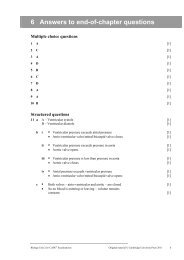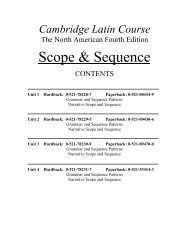Brad Philpot - Cambridge University Press
Brad Philpot - Cambridge University Press
Brad Philpot - Cambridge University Press
You also want an ePaper? Increase the reach of your titles
YUMPU automatically turns print PDFs into web optimized ePapers that Google loves.
Part 3 – Literature: texts and contexts<br />
154<br />
Sample student response (HL)<br />
4 How has one of the universal themes, for example love, murder, ambition or<br />
jealousy, been treated similarly or differently by writers in different cultures<br />
and in different times?<br />
One of the universal themes that we see in many literary works is murder. Three<br />
authors, William Shakespeare, Albert Camus and John Fowles, have treated this<br />
theme of murder both similarly and differently. By exploring Macbeth, The Stranger<br />
and The Collector we will see how each author used murder to comment on the<br />
meaning of life, how their ideas were influenced by their contexts, and how they<br />
used language to express these ideas.<br />
While the storylines of all three works are different, they have one thing in common:<br />
someone dies. Since readers usually look for meaning behind such catastrophic events,<br />
we can assume that the characters of these works die for a reason. Why do the<br />
characters in these works die and what are we supposed to learn from their deaths?<br />
Macbeth kills Duncan, the King of Scotland, because he wants to become king himself,<br />
but his guilt comes back to haunt him and he is eventually killed too. There is an obvious<br />
moral lesson that ambition is dangerous and murder is not a shortcut to the top. The<br />
moral lesson is less obvious in The Collector, where Miranda, a posh, young, pacifistic<br />
girl, is abducted by an autistic, young madman, Frederick Clegg. She needlessly dies of<br />
pneumonia in his cellar. Nevertheless, there is a moral message that one can and should<br />
use violence to preserve one’s life. The Stranger, however, offers a nearly impossible<br />
message to comprehend. When Meursault is asked in court why he killed an Arab on the<br />
beach, his only answer is ‘because of the sun’. It is as if Camus is trying to say people<br />
are murdered for no reason at all. In this sense Camus is different from Shakespeare or<br />
Fowles, by telling us not to look for meaning behind the story of a murder.<br />
In each story, Macbeth, The Stranger and The Collector, murder is treated<br />
differently because each author was inspired by different contexts. Macbeth<br />
is based on the history of King James I, who had just come to the throne in<br />
1606 when Shakespeare presented his play. In reality, Banquo, who was James<br />
I’s ancestor, helped Macbeth kill Duncan to become king. It would have created a<br />
political scandal and cost Shakespeare his head if he had presented it this way.<br />
Shakespeare presented Banquo as the rightful and just leader of Scotland. This<br />
flattered King James. People at that time believed it was a religious sin to kill a<br />
king. Kings were chosen by the hand of God. Shakespeare’s moral lesson was not<br />
only ‘murder is wrong’, but ‘murdering your king is wrong’. In order to understand<br />
the contexts of The Stranger and The Collector, we must also discuss the notion<br />
of God and religion. In a religious world, murder is obviously wrong and life naturally<br />
has meaning. Both characters, Meursault and Frederick Clegg, do not believe in<br />
religion and their murders are meaningless. The fact that they do not feel regret or<br />
remorse makes the reader feel rather uncomfortable. Instead these works seem to<br />
say, ‘Murder happens. Accept it and move on.’ Both Camus and Fowles were inspired<br />
by the ideas of Sartre, existentialism and the Theatre of the Absurd, a movement<br />
that explores the mismatch between people’s attempts to create meaningful lives<br />
Sample<br />
© <strong>Cambridge</strong> <strong>University</strong> <strong>Press</strong> 2011








